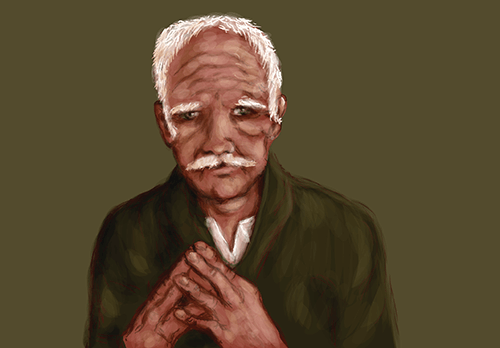[fusion_text]
The Salt of the Earth
[/fusion_text][imageframe lightbox=”no” gallery_id=”” lightbox_image=”” style_type=”bottomshadow” hover_type=”none” bordercolor=”” bordersize=”0px” borderradius=”0″ stylecolor=”” align=”right” link=”” linktarget=”_self” animation_type=”0″ animation_direction=”down” animation_speed=”0.1″ animation_offset=”” hide_on_mobile=”no” class=”” id=””]  [/imageframe][fusion_text]An old legend tells of an elderly gentleman who used to sit out by the well of his village, greeting weary travelers as they came through town.
[/imageframe][fusion_text]An old legend tells of an elderly gentleman who used to sit out by the well of his village, greeting weary travelers as they came through town.
When someone asked him, “What kind of people live here?” He answered everyone with the same question, “What kind of people lived in the last place you visited?”
If the traveler said that he had left a place where the people were happy, friendly, and satisfied, the old man would confidently say that the people in his village were much the same.
If the traveler complained that he had left a community where the people were always fighting, bad-tempered, and selfish, the old man would say, “Sadly, the people here are much the same.”
In other words, people react to us and treat us based on how we treat them. If you are unfriendly, that’s what you’ll get in return. If you pick a fight, most people will oblige you. The opposite is also true. If you want friendship and love, offer it first. If you want respect, give it first.
As Gandhi stepped aboard a train one day, one of his shoes slipped off and landed on the track. He was unable to retrieve it as the train was moving. To the amazement of his companions, Gandhi calmly took off his other shoe and threw it back along the track to land close to the first. Asked by a fellow passenger why he did so, Gandhi smiled, saying, “The poor man who finds the shoe lying on the track will now have a pair he can use.”
As the salt of the earth and the light of the world, good people should always influence people rather than be influenced by them. Remember: a bulldog can beat a skunk, but it is never worth it!
“Ye are the light of the world. A city that is set on an hill cannot be hid. Neither do men light a candle, and put it under a bushel, but on a candlestick; and it giveth light unto all that are in the house. Let your light so shine before men, that they may see your good works, and glorify your Father which is in heaven” (Matthew 5:14–16). —Charles North
[/fusion_text][separator style_type=”single” top_margin=”20″ bottom_margin=”20″ sep_color=”” border_size=”” icon=”” icon_circle=”” icon_circle_color=”” width=”” alignment=”center” class=”” id=””][fusion_text]
Josephus and John
Among the Jews, Josephus is the outstanding historian. He was born only four years after Jesus was put to death. He was seven years old when James was beheaded, and he lived until the end of the first century.
At the age of nineteen years, he took his stand with the Pharisees, the leading denomination of his day. As a historian, he could have said but little about Jesus and His teaching without uprooting his own sect. He tells of the war between Herod the Tetrarch and his father-in-law, Aretas, and of the intrigue between Herod and Herodias. Herod was defeated in the war and Josephus says:
But some of the Jews were of the opinion that God had suffered Herod’s whole army to be destroyed as a just punishment on him for the death of John, called the Baptist.” He also says, “Herod had killed John who was a just man, and had called upon the Jews to be baptized and practice virtue.” The details of the above-mentioned war are not given in the Bible, but Matthew, Mark, and Luke tell of John the Baptist’s rebuking Herod for taking his brother’s wife. Thus between the historian of opposite faith and the writers of the New Testament there is perfect harmony. —Author Unknown
[/fusion_text][separator style_type=”single” top_margin=”20″ bottom_margin=”20″ sep_color=”” border_size=”” icon=”” icon_circle=”” icon_circle_color=”” width=”” alignment=”center” class=”” id=””][fusion_text]
God’s Word Is Like
Honey—sweet (Psalm 119:103).
A lamp—enlightening (Psalm 119:105).
Rain and snow—refreshing (Isaiah 55:10–11).
Fire/hammer—powerful (Jeremiah 23:29).
Water—nourishing (Ephesians 5:26).
A sword—protecting (Ephesians 6:17).
Solid food—filling (Hebrews 5:12).
A mirror—revealing (James 1:23).
Milk—life-sustaining (1 Peter 2:2).
—adapted from Mark Posey
[/fusion_text][separator style_type=”single” top_margin=”20″ bottom_margin=”20″ sep_color=”” border_size=”” icon=”” icon_circle=”” icon_circle_color=”” width=”” alignment=”center” class=”” id=””][fusion_text]
Truly in Vain Is Salvation Hoped for from . . .
- A politician or political party.
- Wall Street.
- Military might.
- Our net worth or economic savvy.
- Government programs.
- The Second Amendment.
- Popularity and fame.
- The worship of nature.
- Exercise and fitness.
- The appeal of our good looks.
- Walls.
- The importance of our occupation or position.
- Our national identity.
- The Supreme Court.
- Ethnicity and race.
- Science and technology.
- Any religious figure besides Jesus Christ (even those claiming to represent Him).
- Family members and friends.
In Jeremiah 3:23, the prophet writes, “Truly in vain is salvation hoped for from the hills, and from the multitude of mountains: truly in the Lord our God is the salvation of Israel.” Jeremiah’s brethren put all their eggs in the wrong baskets. They neglected to see where true hope was found and where saving faith was to be put. Their misguided trust led to their downfall. It cannot be otherwise in any generation, including our own.
We may never say we put our trust in anything besides God, but “the proof is in the pudding.” We demonstrate what’s first and foremost to us every day, in word and deed. Ultimate deliverance from our greatest trials, struggles, and challenges comes from only one source. Ultimate deliverance from our greatest trials, struggles, and challenges comes from only one source. Jeremiah succinctly identifies that source as God. —Neal Pollard
[/fusion_text][separator style_type=”single” top_margin=”20″ bottom_margin=”20″ sep_color=”” border_size=”” icon=”” icon_circle=”” icon_circle_color=”” width=”” alignment=”center” class=”” id=””][fusion_text]
When You Think of Giving Up. . .
Remember the countless achievements that have been made by those who at one time had the same thought but resisted the temptation to throw in the towel.
Elijah thought he was the only one left, but God showed him that he was not.
Paul was discouraged at Corinth, but Jesus had many potential Christians there. A Commissioner of the U.S. Patent Office in 1895 proposed that Congress close the U.S. Patent Office because all of the great inventions had already been discovered. Whether you do something or whether you do nothing, you will still be criticized. The only choice we have is whether we will be opposed for doing good or for doing evil (1 Peter 3:16–17).
[/fusion_text]






